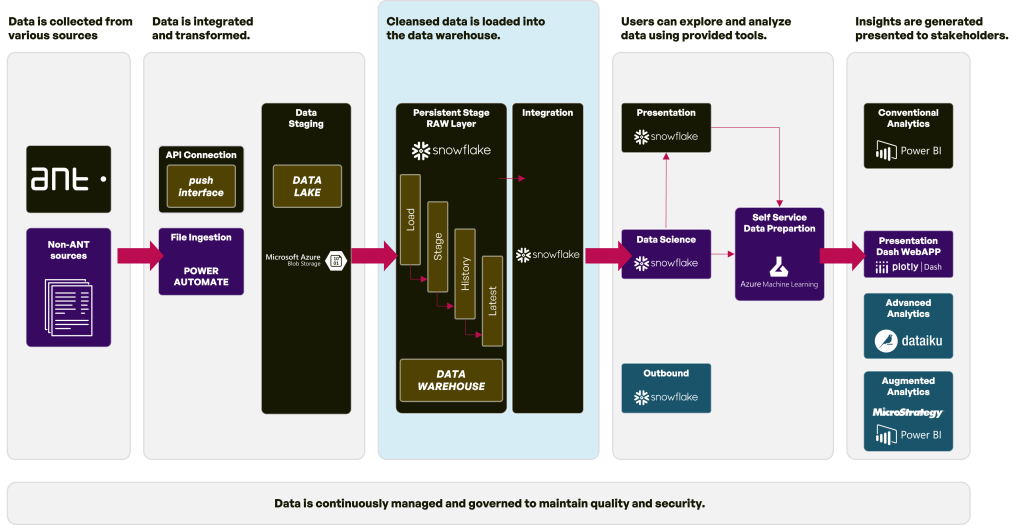- The manufacturing industry is undergoing a digital transformation, fueled by the vast amounts of data generated across the production process.
- An Enterprise Data Platform (EDP) is essential for capturing, storing, and analyzing this data to drive operational efficiency, product quality, and innovation.
- By implementing an EDP, manufacturers can unlock the full potential of their data and gain a competitive edge in the market.
The Role of an EDP in Manufacturing
An EDP is a critical infrastructure for manufacturing companies, enabling them to collect, integrate, and analyze data from various sources. This includes production equipment, supply chain systems, quality control systems, and customer data. By consolidating data into a single platform, manufacturers gain a holistic view of their operations.

The image depicts an Enterprise Data Platform (EDP) architecture. It outlines the data flow from various sources through ingestion, transformation, and storage processes into a data warehouse. The platform further enables data exploration, analysis, and visualization, supported by tools like Power BI and Dataiku. Finally, the EDP incorporates data management and governance components to ensure data quality and security.
Core Components of an EDP for Manufacturing
To effectively address the unique challenges and opportunities in manufacturing, an EDP should incorporate the following components:
-
- Data Warehousing: A centralized repository for storing structured manufacturing data, such as production metrics, equipment performance, and inventory levels. Cloud-based solutions like Snowflake offer scalability and flexibility for handling large datasets. 数据仓库与数据湖,有哪些区别?
-
- Data Integration: Seamlessly connecting data from disparate systems, including shop floor equipment, ERP systems, and PLM systems, is crucial for a unified view of operations.
-
- Data Preparation: Transforming raw data into a usable format involves cleaning, standardizing, and enriching data to ensure accuracy and consistency.
-
- Data Exploration and Visualization: User-friendly tools like Power BI can be used to explore manufacturing data, identify trends, and create interactive dashboards for real-time insights.
-
- Advanced Analytics: Applying machine learning and AI techniques to manufacturing data can uncover hidden patterns, optimize processes, and predict equipment failures.
Key Processes in Manufacturing EDP
Effective data management is essential for deriving maximum value from an EDP.
-
- Data Ingestion: Efficiently collecting data from various manufacturing sources, including real-time data from sensors and historical data from legacy systems.
-
- Data Governance: Establishing data quality standards, ensuring data security, and defining data ownership and access controls.
-
- Self-Service Data Preparation: Empowering manufacturing engineers and analysts to access and prepare data for analysis without relying solely on IT departments.
How it Works?
-
- Data is collected from various sources.
-
- Data is integrated and transformed.
-
- Cleansed data is loaded into the data warehouse.
-
- Users can explore and analyze data using provided tools.
-
- Insights are generated and presented to stakeholders.
-
- Data is continuously managed and governed to maintain quality and security.
Enterprise Data Platform in manufacturing should be designed to streamline data collection, integration, storage, analysis, and consumption for an organization, providing valuable insights to support decision-making.
Empowering Manufacturing with Technology
Specific technologies can accelerate digital transformation in manufacturing.
-
- Snowflake: A cloud-based data platform optimized for data warehousing and analytics, enabling manufacturers to handle large datasets efficiently.
-
- Power BI: A powerful business intelligence tool for creating interactive dashboards and visualizations tailored to manufacturing KPIs.
-
- Dataiku: A platform for data preparation, machine learning, and collaboration, supporting advanced analytics initiatives in manufacturing.
总结
By implementing a robust Enterprise Data Platform, manufacturers can gain a competitive edge through data-driven decision-making, improved operational efficiency, and enhanced product quality. As the industry continues to evolve, the role of data will only become more critical, making EDPs an indispensable tool for driving success.
Read about data integration and preparation to learn further.
了解更多信息

工厂环境中的数据整合与准备方法
Data is the key In the manufacturing sector, data is generated from a multitude of sources, including production equipment, sensors, ERP systems, and quality control

数据仓库与数据湖,有哪些区别?
Data Lakes and Data Warehouses: Cornerstones of Modern Manufacturing The manufacturing industry is undergoing a data revolution. With advancements in technology, factories are generating unprecedented

制造数据分析--利用企业数据平台挖掘洞察力
Manufacturing Data Analytics: Unlocking Insights with an Enterprise Data Platform Manufacturing is undergoing a digital transformation, fueled by the vast amounts of data generated across

